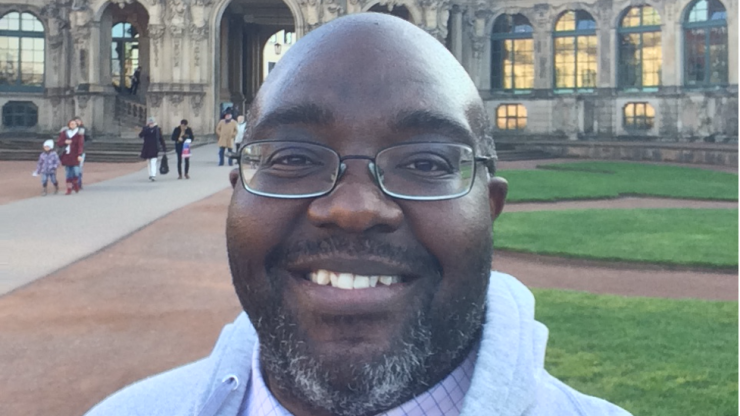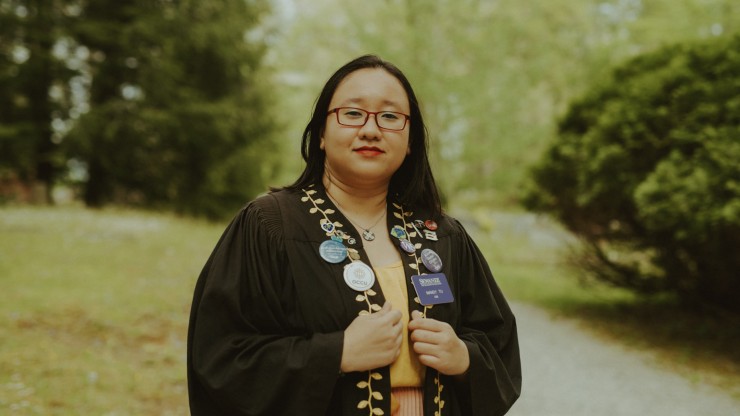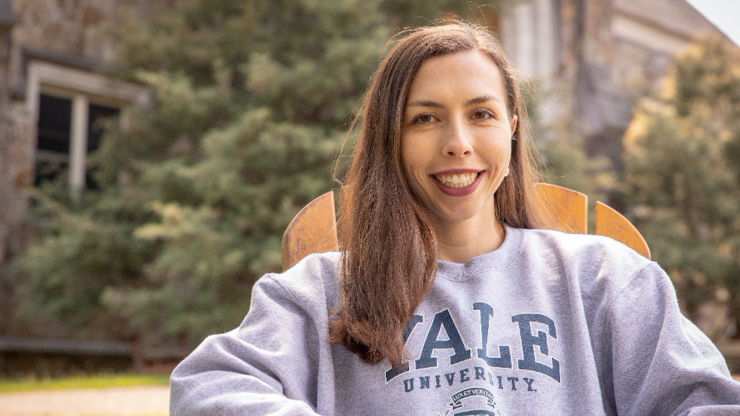See what Sewanee's alumni are doing - come back for new interviews!

An Interview with Robert Holloway (C'98)
Mr. Robert Holloway is a Sewanee alum from the class of 1998. Mr. Holloway majored in English and worked with local schools during his time on the Domain. He currently works as a junior high school teacher.
This interview has been edited for length and clarity.
Q: Why did you choose to be an English major at Sewanee?
A: Well, there are lots of reasons. I definitely knew I wanted to be a teacher at a pretty early age. It was just trying to figure out which subject I wanted to delve into. I came to Sewanee really wanting to do English, but then I always thought I’d be a history teacher as History was also a favorite subject of mine. For Sewanee, what sold me was definitely the reputation. Once I learned more about Sewanee’s role as a literary giant, especially with Sewanee Writers’ Conference and the history of amazing writers who have gone through Sewanee or have been honored by Sewanee. English is such an amazing subject. You can just about do anything with an English degree.
Q: You mentioned that you’ve wanted to be a teacher from a young age. What drove you to want to be a teacher?
A: I actually will never forget it. In the eighth grade we had a teacher takeover day where the honor society at our junior high school was allowed to ask their teacher if they could do their role for one day. I asked my social studies teacher if I could be her for a day. I spent a few days ahead of the day planning what we were going to be studying and what I was going to try to teach and convey to the students. It was a lesson on the Harlem Renaissance, actually. I’ll never forget it. I was able to teach all of her classes and figure out what the role of a teacher is. After that day, I was pretty much sold.
Q: Do you have any advice for English majors currently considering teaching after graduation?
A: Definitely take advantage of all the strong work you do at Sewanee. You definitely have to enjoy working with young people. I have spent a lot of my time working with eighth graders, and I actually thought I was going to hate it, but I ended up spending fifteen years of my career with adolescent learners, and they were amazing. It was a lot of fun working with kids who were a little all over the place in some ways. Just be patient and certainly be kind to your students. Try to gain as much as you can from your college professors as well as your colleagues. The idea of working collaboratively with other teachers is super important. I guess the biggest advice is that you can only control so much. So many students are coming with all kinds of issues, some of them socioeconomic, some of them emotional, so definitely try to make your classroom as safe and kind as possible.
Q: You work with students who aspire to go to college. Some of these students could be first-gen college students. Can you tell me a bit about your work in this area?
A: One of my classes is AVID. It stands for Advancement via Individual Determination. In this program, students elect to take this course. It’s really a college readiness and career readiness course that gets kids into all the different hoops that you have to jump through to get into college or find that awesome career you want to delve in to. As far as first-generation students, I know the status of a few students, but that is super powerful to have students who really, truly want to get into college. That was my big deal when I was in middle school and high school. I surrounded myself with students who I knew were going to go to school. That’s what these students are doing. Of course, there’s the challenge of being the first member of their family to do this. That’s a major accomplishment.
Q: Thinking back on your time at Sewanee, was there a particular course or professor that stood out to you?
A: There were so many amazing classes and professors at Sewanee. It’s hard to say. As far as education classes, there were two classes that I absolutely adored. They were both social science classes. Dr. O’Connor’s Anthropology of Education class was a breath of fresh air. It was so powerful only because he made us go out and do real research inside some schools. Dr. Register’s History of American Education was an awesome course. It was interesting to get into the evolution and development of education in American. As far as English, I had so many amazing courses. In Dr. Macfie’s and Dr. Richardson’s Shakespeare classes, you had to be a really strong critical thinker for those classes. I really admire Dr. Macfie for allowing me to choose my own topic for one of my assessments. Dr. Michael’s Romanticism course was great. I fell in love with William Blake and the 18th century. The romantics are where it’s at.
Q: Do you have any closing remarks, or anything else you’d like me to put into this interview?
A: I thank Sewanee for the education I got and the ability to work with a lot of people in the community. I taught at the junior high in Cowan and at St. Andrew’s Sewanee. Working down there with them was very beautiful. Hopefully more Sewanee students who are considering teaching are still able to form relationships with places like St. Andrew’s Sewanee. I really appreciated the opportunity.

An Interview with Mandy Tu, C'21
Hello dear readers. My name is Morgyn, I’m another contributor to our website, and this week I would love to introduce you to recent Sewanee grad Mandy!
Q: Would you like to introduce yourself to readers who may not know you?
A: I’m Mandy Moe Pwint Tu and I graduated from Sewanee in May 2021..At Sewanee, I served as the president of the Organization for Cross-Cultural Understanding (OCCU) in my sophomore and junior years and was the president of the Order of the Gown (OG) in my senior year. I’m a writer and a poet.
Q: What are you up to since leaving Sewanee?
A: I just started my MFA at the University of Wisconsin at Madison!
Q: How has your time at Sewanee influenced your career and education plans?
A; Sewanee taught me the importance of claiming your specificity in spaces that weren’t particularly built for you. I’d always known I wanted to be a writer, but my time at Sewanee encouraged me to consider my place in the world and how I can take the status quo and make it better. I’m working on my MFA now, which is arguably as selfish a pursuit as one can imagine, but I hope to use it in service of those that need my time and energy the most.
Q: If you have one thing to say to Sewanee students or alums, what would it be?
A: What happens because of you? How will you do your part to move Sewanee forward, to make her better?
Q: What is your favorite Sewanee memory?
A: I have so many! The chaos of OCCU potlucks, the calm of evenings in the cemetery, writing poetry, conversations at Stirling’s with my professors—they’re all my favourite.
Q: What was your favorite English class to take at Sewanee?
A: World Literatures in English with Dr. Derek Ettensohn. I deeply appreciated the opportunity to yell about colonialism in an academic setting.
Q: What is your favorite thing about your current situation?
A: The space and time to focus on, read, and write poetry, and the fact that I’m surrounded by as many like-minded creative individuals as I am by lakes! (Madison has four lakes; there are four other members in my MFA cohort.)
Q: What is it like being a Watson Fellow?
A: It’s a great honor! I’m looking forward to embarking on my Watson journey in two years’ time, after I receive my MFA. I can’t wait to meet and talk about poetry with poets all over the world!
Q: Are you working on any new published works?
A: I have a poem called “Ginkgo” coming out on September 27th with The Lumiere Review, inspired of course by our Sewanee ginkgoes. I am currently focusing more on writing and workshop and a little less on publishing.
Huge thanks to Mandy for taking the time to interview with us, and best of luck on your future endeavors! For more interviews with Sewanee English Department alums, and info on things happening in the department, keep an eye on this space, and follow us @sewaneeenglish on social media!

An Interview with Claire Crow (C'21)
Claire Crow, C’20, is a Sewanee alumna from Dallas, Texas. She majored in English with a minors in French and Medieval Studies. Her honors thesis was titled “Between Life and Death: Racial Formation, Feminine Bodies, and Colonialist Fantasies in Middle English Romance” Claire was recently accepted into the English PhD program at Yale where she is also a fellow for the Center for Race, Indigeneity, and Transnational Migration.
Q: Why did you choose to be an English major at Sewanee? If someone were to ask you why they should choose English as a major, what would you say?
A: I came to Sewanee as a freshman, pretty sure that I wanted to be an English major, but the things that really solidified my decision were the in-class conversations and each professor’s enthusiasm about their respective fields. To someone choosing a major: I would say that you genuinely won’t find another department on campus like English because every single professor, and most of the students too, show up to Gailor every day excited about learning/teaching. If you want to be a good writer and thinker, you’ll without a doubt find a faculty member who will support your learning and research. I got nearly all of my support from the English department for things both related to and unrelated to academics. I was actually going to transfer schools after freshman year when my dad passed away, but Dr. Jafri spent hours and hours talking me through the decision, to the point where I realized that there’s likely no other place or people that would ever be this invested in my personal and academic growth. I am BEYOND glad I stayed!
Q: What English courses from your time at Sewanee struck you as the most influential or rewarding to take? If you had to choose a favorite English course that you took at Sewanee, what would it be?
A: Two courses during my sophomore year and two during my senior year were the most influential. As a sophomore, I took Stephanie Batkie’s Chaucer seminar, which was definitely the hardest course I had taken yet. Despite it being the hardest, it was the class that really confirmed my interest in the medieval period and the class also showed me that I could improve my writing so much if I really worked at it. Matthew Irvin’s survey of medieval literature was also important for me because it was the first time I encountered other genres of medieval literature like romance, plays, songs, chronicles, sagas, mystical texts, etc. As a senior, Batkie’s literary criticism class was another hard one, but it opened up for me so many different kinds of contemporary theoretical frameworks through which I could read the medieval texts I was (and still am) researching. Finally, I just really loved Maha Jafri’s Victorian novel class because I used to make fun of her for always talking about Middlemarch; I finally decided to take it in my last semester and now I, too, talk about Middlemarch constantly, and as a result I’m actually taking a graduate seminar right now on George Eliot.
Q: Is there a specific text, or group of texts, that you find yourself coming back to? If not a text, then an author or poet?
A: So far, the genre I keep coming back to for research is late medieval French and English romances. I wrote my undergraduate thesis on two romances, the king of tars and the sultan of Babylon, and explored how these two Middle English romances articulated race, childbirth, sexuality, and embodiment. Critical theory from Achille Mbembe, Jacques Lacan, and Homi Bhabha was really useful/illuminating for my overall arguments.
Q: What are you planning on working on during your time in grad school? Any exciting classes or projects on the horizon?
A: In graduate school, I’m planning to explore topics akin to what I just described above, but I’m broadly interested in the ways in which late medieval literature racializes and sexualizes bodies in specific ways. So far, I’ve been focused on how European writers represent races, femininities, and alterity, but next summer I’m going to start learning Arabic so that I can better understand how Arabic sources conceptualized Europe. This is a bit specific, but I’m hoping to develop / research more into a mini section of my undergraduate thesis about racialized fluids and the reproductive policing of Muslim women in Middle English romance.
Q: Outside of your studies, are there any writing or literature-based projects you're working on? Are you still co-hosting the Knight School podcast?
A: I have a fellowship at Yale with the center for Race, Indigeneity, and Transnational Migration, so I will be doing a lot of interdisciplinary work and events within this community. And this isn’t really outside of my studies, but I’m planning to present at a conference or two next summer in England, so I am about to start working with a medieval studies reading group here at Yale called Scriptorium, composed of students and professors, in which I will present some of my work and get feedback before the conferences. I am taking a break from the podcast at the moment while class starts, but hopefully we can start that up again soon!
Q: What are your plans after grad school?
A: I have at least 6 years of grad school, so I'm not sure what my plans are. Hopefully I’ll be teaching and researching!

